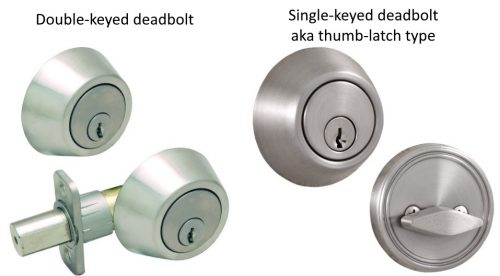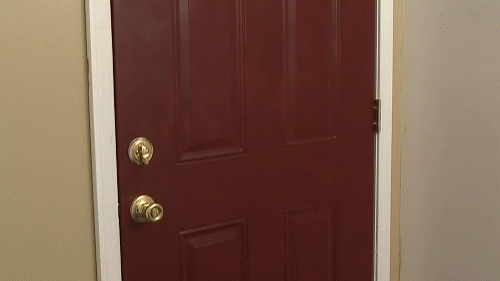Are double-keyed deadbolts legal? Are they safer? More secure? Great questions.
First, let’s define a double-keyed deadbolt. It’s a deadbolt that locks from the inside and the outside with a key. This means if the door is locked, there’s no getting in or out without a key.

Added Security
Police officers seem to prefer double-keyed deadbolts because of added security. It’s fairly easy to break into a home with a glass sidelite (window) on the front door. The burglar simply smashes the glass, and then they can reach in to unlock the door.
Police officers also like double-keyed deadbolts because they make it difficult to steal big stuff. If someone gains entry to a home by sneaking through a window, they can get out of the house very quickly with a lot of stuff by opening from the front door from the inside. With double-keyed deadbolt locks, however, that’s not such an easy option.
These are the arguments I’ve heard. I’m not here to debate the validity of these argument, but here goes anyway. One or two well-placed spartan kicks from a large person is all it would take to destroy a door jamb, rendering any type of deadbolt useless.
But to go down the rabbit-hole even further, the whole kick-in-the-door thing is a good reason to consider a jamb reinforcement kit like the StrikeMaster II for added security.
Safety Concerns
The problem with double-keyed deadbolts is reduced safety. If someone needs to get out of their home during an emergency but the double-keyed deadbolt is locked, you’re stuck looking for a key or a window to climb out of. When it comes to deciding between safety and security, I choose safety.
People who advocate for double-keyed deadbolts suggest leaving a key in the deadbolt at all times, except for when you leave the home. That makes sense, but still, you have an increased potential for someone in the home to take the key out of the deadbolt while it’s locked. If you have kids, you get it ;-).
Yes, they’re legal
Here in Minnesota, you can’t build a new home with a double-keyed deadbolt. At the end of section R311.2 of the Residential Building Code, you’ll find this: Egress doors shall be readily openable from inside the dwelling without the use of a key or special knowledge or effort.
But that’s only for new homes. Once a person has taken occupancy of a home, they can do whatever they want with the locks. Minnesota Statute 326B.106 (d)(4)(g) says this about double-keyed deadbolts:
(g) Double cylinder dead bolt locks. No provision of the code or appendix chapter of the code may prohibit double cylinder dead bolt locks in existing single-family homes, townhouses, and first floor duplexes used exclusively as a residential dwelling. Any recommendation or promotion of double cylinder dead bolt locks must include a warning about their potential fire danger and procedures to minimize the danger.
In short, double-keyed deadbolts are legal on existing Minnesota homes. They may provide some added security, but as a home inspector, I’m much more concerned with safety. For that reason, I typically recommend replacing double-keyed deadbolts with a thumb-latch type that doesn’t require a key to escape.



Tim Mengelkoch
December 31, 2019, 12:19 pm
Good article Reuben.
We put one in our front but we leave the key on a hook just inside the door and far enough that someone could not reach thru and get it
Harry Janssen
December 31, 2019, 7:37 pm
I always encourage my clients to get rid of the double key locks, in an emergency they can create a serious problem, we have insurance for theft but not loss of life
George Benigno
January 1, 2020, 9:10 am
Awesome what you do, all including those in the trades and have the same profession can and should learn from you. Amen
Sean S.
March 5, 2020, 2:11 pm
In my experience, some locksmiths won’t even put them in, noting the safety risk, and not wanting to be liable for it. A locksmith mentioned this to me when I had to get a double keyed lock removed and replaced with a single one.